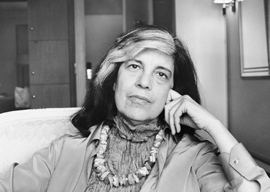
May 23, 2017

Susan Sontag
So Mary McCarthy felt compelled to start a new periodical in 1952, for reasons that, as paraphrased by Nelson, will sound depressingly familiar:
In liberal magazines like the “Nation” and the “New Republic” anxiety about the “security” of their “beleaguered” position “[drove] them to suppress, like military censors, any facts or ideas that might tend to support the enemy’s side.”
Those same liberals reviled Arendt’s frank, unenthusiastic perspective on school desegregation, “Reflections on Little Rock“ (1957), leading her to shoot back:
Recent developments have convinced me that…the routine repetition of liberal clichés may be even more dangerous than I thought a year ago.
We conservatives sneer at the left’s tendency toward “self-congratulation as a basis for social policy,” so it’s startling to hear all these long-ago liberal women decrying the same thing.
Yet Nelson assures readers that none of them ever defected to the right, in the manner of (male) peers like Podhoretz and Horowitz:
When the social movements of the late twentieth century recommended the healing power of empathy as the glue of solidarity and the fuel of progressive politics, Arendt and McCarthy recoiled, not from the goal of social justice, from the path of it.
Ugh.
It became fashionable in my youth to praise artists, particular female ones, for their “generosity of spirit,” a pleasant-sounding expression I confess I still don”t quite comprehend. Likewise, my “serious” writing is regularly described by generous souls as more “compassionate“ than it really is. And Nelson looks askance at the latter-day detection of “empathy” and other ameliorative motives supposedly underpinning Arbus” photographic “practice.” (As she calls it. Yes, alas, Nelson insists on deploying that species of academic jargon and cadence that reduces even genuinely profound observations to the sound of a hollow stick banging an empty drum in a vacant room. Whereas Rosemary Dinnage managed to write a similar book, Alone! Alone! Lives of Some Outsider Women, without so much as a smidge of this lingo.)
Why, I wonder, can”t Arbus have been just a crazy, venal woman who wanted to take neat pictures of weirdos?
So clearly, I”ve failed the sensibility test. Long ago, in fact. One of the first things I did after I got lupus was buy Susan Sontag’s Illness as Metaphor (1978), written after the cancer diagnosis that had so discombobulated Woody Allen.
Sontag again defied societal expectations. Her book was more of a “natural history of cancer” than the customary First, You Cry, first-person pleure “illness memoir.” It was (and remains) a bracing read. But as I”d already discovered to my dismay when I was still an A-cup, I was, cerebrally speaking, no Susan Sontag.
My subsequent book about being sick was cover-to-cover self-absorbed screeching. No apologies.
Except, I guess, to Woody Allen. But then again, he’s not my hero anymore, anyhow.